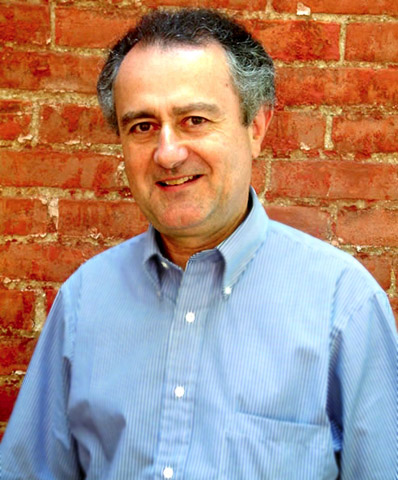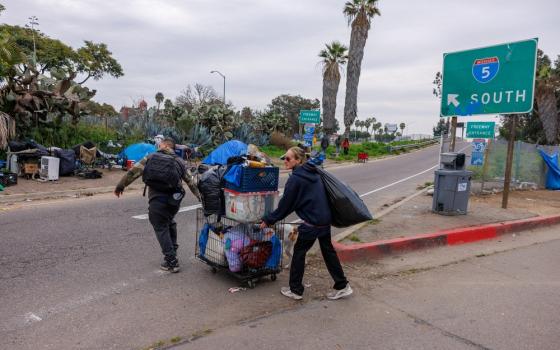
Richard Sweeney
People who support plundering the planet for fossil fuels, who deny the reality of climate change and who excommunicate priests supporting women's ordination have something in common, according to a former priest and Jungian psychoanalyst.
Richard Sweeney, who lives in Columbus, Ohio, said in an interview with NCR that those people think in terms of extremes, "a tendency which is innate in the psyche." But the psyche strives toward balance, wholeness and connection to resolve this tension of opposites, Sweeney said.
"When anything becomes too one-sided, in both humans and nature, there will inevitably be a compensation, a reaction to restore the balance," Sweeney said. "A person who works 80 hours a week will either develop a disease or else will burn out. That is the way the psyche tempers what is happening by forcing him or her to slow down and rest."
He used two contemporary examples that environmentalists and progressive Catholics can relate to: Hurricane Sandy and problems in the church.
"When society wrests the energy from nature, without regard to nature itself, the natural world becomes ill and we get the repercussions," Sweeney said of the superstorm.
Sooner or later, "the reality of what is happening breaks down our denial and forces itself in to our consciousness."
The second example comes from the exodus of thousands of Catholics -- priests, sisters and laypeople -- from the church during the 1980s, when the leadership refused to continue to implement the Vatican II reforms initiated by Pope John XXIII and closed down dialogue.
Sweeney was one of those perturbed by the hierarchical resistance. Ordained a priest for the Archdiocese of Cincinnati in 1974, the young Springfield native had been positively influenced by Pope John's council.
"There was a great openness to the tension of opposites, to alternative points of view," he said. Sweeney particularly appreciated that Protestants were welcomed in dialogue.
He said he remembered the creative tension that took place then.
"The dialogue between opposing points of view was transformative," he said. "There was such energy."
But the change and growth that arose from these discussions created anxiety among the Vatican and many bishops. The uneasiness is still going on. Church leaders feel threatened by what they regard as a hazard to a stable identity.
On the environmental side, continuing information from the scientific community concerning the fragility of our planet has challenged and frightened the status quo in the oil and gas industry and in other large corporations, he said.
Denial, silence and the refusal to engage in real dialogue have created problems on both fronts.
Within the church of the 1980s, the blockade did not sit well with Sweeney. He had been teaching at the local seminary in Cincinnati at the time and received permission to do graduate work in psychology and religion studies at the Graduate Theological Union in Berkeley, Calif. Classes there led him to pursue a diploma in analytical psychology from the C.G. Jung Institute in Zurich.
As Sweeney's perspective continued to deepen, he witnessed more and more suppression in his church.
"I was on a collusion course, and felt more and more disassociated from a leadership which refused to dialogue about the possibility of married priests and the ordination of women," he said.
He saw parallels within the life of Carl Jung. The son of a Swiss Reformed Christian minister, Jung remained interested in religion all of his life but "was critical of one-sided dogmatism and literalism which stifle the dynamic movement of the Spirit."
Sweeney said Jung became especially taken with the theology of Nicholas of Cusa, a 15th-century German Catholic cardinal, scientist and philosopher. Nicholas' main thesis saw God as always trying to facilitate the coming together of opposite tendencies. In Nicholas' view, "transformation only happens in the unity of opposites," Sweeney said.
So how can this ideal unity come about when, in the words of German philosopher Ludwig Wittgenstein, "the limits of my language are the limits of my world"? Or when people's values are not the same? What about when there are layers upon layers of different personality types, as seen in the Myers-Briggs Type Indicator psychological assessments? Or when blind, unquestioning obedience is seen as the primary earmark of a good Catholic?
Sweeney acknowledged the difficulties. But the dialogue has to keep happening.
"The best we can do is try to see the value in the other person's opinion and develop a tolerance for their view, even though we do not agree with it," he said. He advised trying to relate personally at some level so "the person is no longer the enemy to be destroyed or defeated.
"Being open to opposing views sets up a creative tension and can lead the way to transformation," he said. "The union of opposites is what creates a new approach. Silence and refusing to engage perpetuates unhealthy situations."




